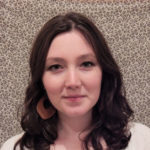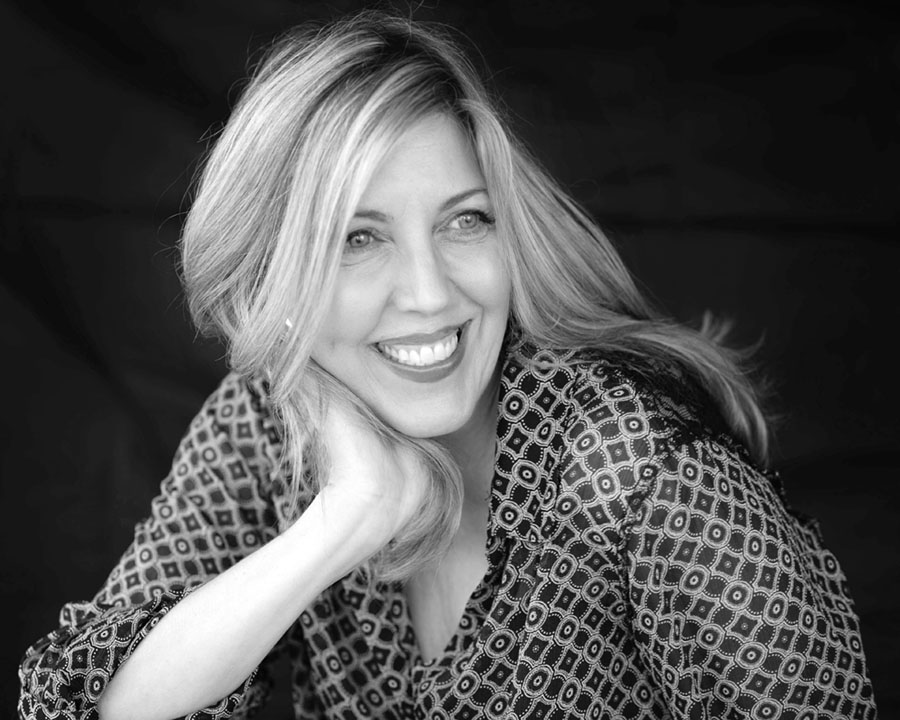Summer 2021
3
Moving Gently in the World:
A Chat with Kelli Russell Agodon
Abriel Newton, Editor (Class of 2021)
Moving Gently in the World:
A Chat with Kelli Russell Agodon

Abriel Newton
Class of 2021
One of the more tremendous highlights of the Rainier Writing Workshop is the community so central to the program’s success. Students, alumni, and faculty are accustomed to long-distance relationships, so to speak, and have flourished in a virtual realm long before the pandemic. Alum Kelli Russell Agodon (2007) began her relationship within the RWW world as a poetry student; when she finished the program, Kelli ignited.
She is the cofounder of Two Sylvias Press, where she works as an editor and book cover designer. (You can read Nathaniel Youmans’s (2020) conversation with Kelli here.) Kelli is also the Co-Director of Poets on the Coast: A Weekend Retreat for Women. Her newest book is Dialogues with Rising Tides from Copper Canyon Press; she is the author of four collections of poems, two books of poetry prompts, and she co-edited the first eBook anthology of women's poetry, Fire on Her Tongue.
Now, we welcome Kelli fully back to RWW as the newest poetry faculty member. I am delighted to share my conversation with her.
Abriel Newton: What are you most looking forward to in coming full circle and rejoining the Rainier Writing Workshop community? What made you want to come back?
Kelli Russell Agodon: The request to return to RWW felt unbelievably synchronistic to me. The day before I received the email from Rick about being part of the faculty, I had been saying to a friend, “I miss RWW. I really want to return there, I want to sleep in the dorm beds again…” Okay, maybe I don’t really want to sleep in the dorm beds, but I had been reflecting on how much my time at RWW meant to me, and how it shaped me as the poet I am today.
What am I most looking forward to? The people who make up RWW. The spirit, the support, the love for learning, writing, and reading. I love being in a community of poets and writers who love words and are moving deeper into their craft. The choices I’ve been making in my life lately revolve around two questions: Can I be helpful and useful? Am I still able to control my time? The answer was an easy yes, so, I’m thrilled to be part of the RWW community again.


Kelli Russell Agodon
AN: Particularly integral to the RWW program is the mentorship throughout the year. Is there a mentor or teacher who was especially inspirational to you?
KRA: Yes—Peggy Shumaker. Peggy is the essence of what a good literary citizen is and is the living example of generosity, support, intellect, and creativity. She was extremely inspirational to me both in her poetry—how and what she writes—and also as a human in the world.
The year I worked with her, I got a rare case of optic neuritis and lost my vision in both eyes over a two-month period. Her care during that time, as well as her guidance throughout my mentorship, allowed me to grow as a poet and a person. I am truly thankful for my year working with her.
AN: Can you speak a little about your teaching philosophies and what you hope to bring to your mentorships?
KRA: As someone who did not learn well from highly critical teachers, mentors, and professors, my goal is to help each poet see what they are doing well, and then learn how to do it even better. My philosophy is always “do no harm,” and to work to help each poet find their own individual voice and style. I want to help them learn and understand why they are making the choices they are making in their work.
My goal would be to help each poet stretch themselves, continue to take risks, and learn how to become the best editors of their own work. I am an easygoing Capricorn, but make no mistake, I definitely have Capricorn traits. I believe that hard work pays off, as well as soft work, and that details matter. I believe as writers we can always be better than we are—which is not a negative, but just to know there are always ways we can grow and develop as writers and as humans.
“I believe as writers we can always be better than we are—which is not a negative, but just to know there are always ways we can grow and develop as writers and as humans.”
AN: During your life, was there ever a major event or experience that completely shifted your approach to, or your relationship with, writing, or your identity as a writer?
KRA: Yes, when I graduated from the University of Washington, I was offered two jobs—one was at a small environmental press, and one was with a big corporation that published those HUGE Entertainment coupon books in the ’90s that were sold for fundraising. I knew in my heart that the small press was the better fit for me, but I took the job that paid the most, came with an office, prestige, an expense account, and enough status to make me feel as if I had “made it.” The first two years, I wore fitted suits, received promotions and pay raises, and worked 70-hour weeks. In year three, I realized I wasn’t writing poetry, or even reading books. I joined a small monthly poetry workshop with Paula Gardiner in Seattle. We’d have tea and share poems 7 p.m. to 9 p.m. Thursday evenings.
I realized the job I chose with my head and not my heart was not doing me any favors as a writer. But I was afraid of leaving, what do they call it… “golden handcuffs”? Well, I had golden handcuffs as well as golden ropes and a blindfold! I shared with Paula one day that I didn’t like my job and wanted to quit to be a poet. I said, “But I’m afraid I can’t afford to quit.” And she looked at me and said, “How can you afford not to?”
Those words changed my life. From that moment, I worked to transform everything—I stashed away as much money as I could, and then six months before being fully vested in my 401(k), I quit. I left Seattle and moved to a small town—Kingston, Washington (which is a ferry ride away but felt like a new world to me).
This experience taught me a lot about myself. I learned that every decision I make with my head ends up wrong, and every decision that comes from the heart, or that inner-place of knowing, ends up working out. And that sometimes we have to discover what we don’t like to find our best path. I also learned I was not as money-driven as I thought I was, and I wanted to exist as a poet. I could create a life with poetry as my “True North”: Sometimes you don’t necessarily need to know where you’re going or how to get there, but you just need to point yourself in the right direction and start walking. You can move on or off the path at any time but keep aiming in the general direction of your dreams.
“Sometimes you don’t necessarily need to know where you’re going or how to get there, but you just need to point yourself in the right direction and start walking.”
AN: Is there anything that you’re reading lately that’s inspired you?
KRA: Yes! Last week I went to an outdoor coffeeshop, and, as I was walking away, I saw someone had written, “Did you remember your sunglasses?” in Sharpie marker on a metal pole—and well, I had forgotten my sunglasses on the table, so I thought how helpful that was.
But I’m also currently midway through Red Comet: The Short Life and Blazing Art of Sylvia Plath by Heather Clark. I’m also reading The Book of Delights by Ross Gay. The Plath biography is well-written and interesting, even if one isn’t a fan of Plath, but because I am, I’m just intrigued by it. The Book of Delights just delights, as the title suggests. Both inspire me in different ways, but both remind me to pay attention to the details.
AN: What is something you absolutely love to do, totally outside the writing world?
KRA: Paddleboarding. I want to be out on the water anytime I can. It’s extremely meditative for me, and helps me leave the “real world” to appreciate the beauty of the sea and all its creatures. I do a lot of creative thinking while out on my board, but the paddleboarding and balance keeps me in the moment.
I just had the opportunity to paddleboard in Maui with sea turtles—well, they weren’t actually paddleboarding, but they would arrive each morning to swim near my board. It was soulfully magical, but it also reinforced my dedication for caring for our lands and oceans. When I am viewing our planet from atop a wave, my entire body at that moment is full of gratitude, but I also have an incredible awareness of what there is to lose and how we can move a little more gently in the world.
Kelli Russell Agodon (2007) lives in a sleepy seaside town in Washington State on traditional lands of the Chimacum, Coast Salish, S'Klallam, and Suquamish people, where she is an avid paddleboarder and hiker.
